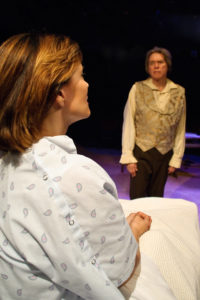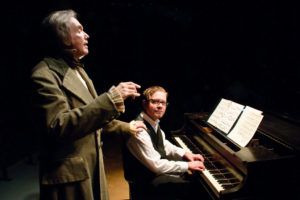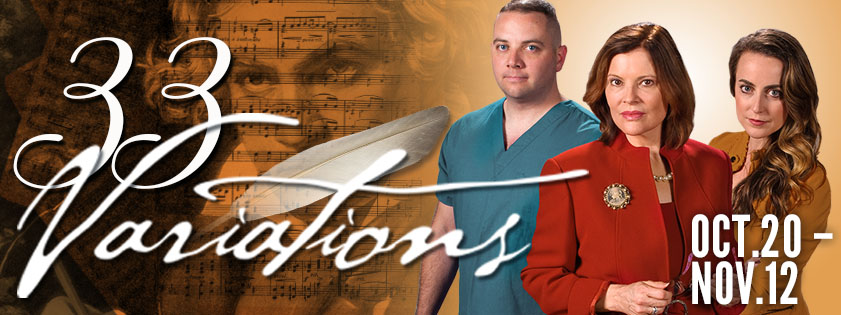Theme and Variations as defined by Merriam-Webster “a standard form of musical composition consisting of a simple usually harmonized melody presented first in its original unadorned form then repeated several or many times with varied treatment so based on the theme that at least some semblance of its general melodic or harmonic form is evident”. While the definition pertains to music it can also be thought that our lives are a variation on a theme or ideal of what we imagine and hope it will be. These ideas are explored in the current production at Colonial Players of Annapolis in Moisés Kaufman’s 33 Variations directed by Terry Averill.

The play takes place in both the 19th Century and present, paralleling Dr. Katherine Brandt and her determination (obsession) in researching composer Beethoven’s 33 Variations on Diabelli’s waltz as she battles the stages of ALS with Beethoven’s obsession with the waltz as he writes the variations while going deaf and losing his health. Cleverly the 33 Variations themselves are used to break up the scenes and set the tone for each scene in the show. The play is sure to tug on the heart strings of everyone who sees it, with an extra tug on those who have been caretakers or loved someone with a degenerative disease.
The set, designed by director Terry Averill, is simple and yet diverse, featuring furniture that is frequently moved around to create all of the spaces across both timelines that the actors step into; everything from a modern hospital to an office in the home of Beethoven himself is available. Averill also takes advantage of projections and puts them up on a series of curtains hung around the space displaying pictures and words that add to the atmosphere, putting the audience into the world of the play. The projections even include moments of seeing music being written as Beethoven composes; you get a small glimpse inside the brain of a master. Lighting Designer Alex Brady uses simple lighting to evoke the feelings of each scene. Sound Designer Richard Atha-Nicholls brings in environmental sounds that you may forget are there sometimes, but the show would be lacking without them as they truly do immerse you into the characters’ world. Costumer Carrie Brady has dressed the actors in a wide variety of clothes from authentic period clothes for the 19th Century to modern clothes perfectly picked for each character’s personality. It is worth noting that the show employs bright flashes of light and high pitched sounds.
Director Terry Averill has assembled for his production a very talented group of actors who interact and play off each other extremely well. Rebecca Downs takes on the role of Dr. Katherine Brandt, the lead and toughest role in the play, who through the journey of the show portrays the progression of ALS. Downs portrays the role with passion and grace making you wonder if she may be a real life Beethoven fan. She tackles her character’s progression through ALS with precision, going from only showing symptoms in her hands to being wheelchair bound with a numb tongue. Downs has created a character that is both believable and heart wrenching.
Tackling the role of Dr. Brandt’s daughter Clara is new comer to Colonial Players Victoria Scalfaro. The role calls for great emotion and caring even in the silence, a call that Scalfaro has readily answered. Her portrayal of Clara as a daughter who just wants to spend time with her mother, while also falling in love with her mother’s nurse, is relatable especially to anyone who has been in the caretaker position for a loved one. She plays Clara as both a fierce protector and a scared daughter, tackling moments that may require extra tissues in your pockets.

Joining the Brandt women in their present day journey are characters Mike Clark and Dr. Gertrude Ladenburger. As Mike Clark actor Paul Valleau plays an empathetic male nurse who wants to take care of his patient but is also falling in love with his patients’ daughter. He brings with him moments of light hearted laughter and the strong yet tender nature of a caretaker’s rock. As curator Gertrude, actress Jean Berard lights up the stage with humor and is wonderfully well cast in a role that seems as if it were made just for her. Though the role is full of well delivered humor, Berard also manages to capture the efforts of a friend who grows close to Dr. Brandt as her illness progresses.
Going back to the 19th Century we meet characters such as Mark T. Allen’s Anton Diabelli, the creator of the waltz that captured Beethoven. Allen portrays a man who is both a businessman just trying to do his job and a man who is concerned for his friends wellbeing. While he only has a limited time on stage Allen makes sure that you feel his presence whenever he is there. Actor Dann Alagna takes on the role of Anton Schindler, who is very much so the play’s comedic relief. Alagna brings honest humor to Schindler who is just trying to do his job; the part is sprinkled with moments of honest concern and grief that Alagna flawlessly transitions through.

Greg Jones Ellis is perfectly cast in his role as musical genius Ludwig van Beethoven. His portrayal perfectly captures Beethoven’s obsession with Diabelli’s waltz and finding everything that it has to show him. Ellis takes you from an angry obsessed Beethoven to a sick deaf Beethoven who just wants to find the close of the variations. Ellis brings a passion and strength to his character that perfectly plays with Downs’ Dr. Brandt, which brings the parallels between them even closer.
The acting troupe is rounded out by ensemble members Dirk Gertz and McAndrew Noonan who not only serve as ushers before the play start but are responsible for all of the set changes throughout the entirety of the show. The pair make several costume changes to fit the theme of the scene and then are suddenly gone. They never say a word but help the show flow flawlessly.
Naturally a show about music involves actual music, instead of having music come through a speaker 33 Variations has a pianist right there on the stage with the actors. Pianist Ryan Shookman never leaves the stage and is a character all on his own, interacting with both Beethoven, Schindler, and Dr. Brandt. Shookman is a remarkably talented pianist and his playing captivates the listener. Fans of Beethoven’s work will enjoy the way he brings them to life on the keys.
33 Variations is a heartfelt piece that shows you that even if your life doesn’t go how you planned or how everyone else’s life is, it is still beautiful. It is a show that will require many tissues stuffed in pockets and a hug for your loved ones when you get home. The talented cast and crew have truly brought this piece to life with passion, it is truly not a production to be missed.
Running Time: 2 hours with one intermission
33 Variations plays through November 12, 2017 at The Colonial Players of Annapolis— 108 East Street in historic Annapolis, MD. For tickets call the box office at (410) 268-7373 or purchase them online.


I would STRONGLY object to Mr. Green’s characterization of the pianist in this performance. If he took his foot off the damper pedal at any point, it was by accident. Lacking both technique and taste, he proved himself woefully incapable of reproducing even a hint of Beethoven’s intentions. The theme — a waltz — was unrecognisable as a dance, the off-beats accents, if they were played, were lost in the haze of over-pedaled blur. But the MINUET of the 33rd variation elicited the greatest sin of all. It was played as a loud, galumphing oom-pah-pah, instead of the almost parodistic delicacy Beethoven intended.